Kansas Law Review
Overview
The Kansas Law Review is a student-edited journal of legal scholarship published five times yearly. It publishes articles about all areas of law, but especially welcomes articles discussing state law issues, topics pertinent to the Plains region, and legal ethics and legal advocacy skills.
The Law Review publishes articles written by law professors, judges and practicing attorneys. Each issue also contains legal comments written by Law Review student editors. One issue in each volume exclusively discusses issues of Kansas law. The Law Review hosts an annual symposium on a special topic of law and publishes scholarly written work submitted in conjunction with the symposium in a special issue.
Membership on the Kansas Law Review is determined based on KU Law students’ grades and performance in a writing competition held every spring semester. Members are eligible for academic credit for their service as staff members in their first year on Law Review and as board members in their second year.
About the Kansas Law Review
2025-2026 Board of Editors
Editor-in-Chief
Peyton Emler
Managing Editor
Ben DeKoning
Executive Comments Editor
Madi Stapleton
Symposium Editor
Michael Moore
Articles Editors
Davis Bax
Kaegan Cowan
Thea Schneider
Hannah Levy
Hadley Sayers
Comments Editors
Luke Arney
Lane Barrette
Remi Moeller
Alec Nee
Staff Editors
Abby Brady
Alex Davis
Amreen Sauji
Bella Price
David Holt
Ed Gramling
Gini Horton
Jeremy Beckner
Keith Marshall
Landon Sloan
Lauren Fallis
Louis Christifano
Mary Duncan
Rose Muldoon
Sadie McWilliams
Trey Bohlender
William Mitchelson
Sophia Zheng
The Kansas Law Review requests that contributors submit the following:
- A cover letter with complete contact information.
- A curriculum vitae, or other information about the author.
- A copy of your article.
We accept submissions in several different formats:
- Use of Scholastica for submission is preferred.
- You may also submit the article electronically, preferably in Word format, to kulawrev@ku.edu.
- Hard copies, if desired, may be submitted to:
Managing Editor, Kansas Law Review
University of Kansas School of Law
1535 W. 15th Street
Lawrence, KS 66045 - There is no maximum page limit, and articles of all lengths will be considered. The only student pieces we publish are those written by University of Kansas School of Law students.
Publishing with the Kansas Law Review
Our Editing Process
The Law Review’s editing process is designed to maintain the author’s voice and style while ensuring proper grammar and citation. We take seriously the author's comments throughout the editing process. And generally, we conceive of the editing process as an interactive collaboration between the author and our editors.
Each article goes through three rounds of editing and proofreading. The author receives two opportunities to make substantive and stylistic edits and review our edits, and one additional opportunity to review the final version of the article before it is printed. Our editors draft memos for each author highlighting editorial changes and questions.
Authors who have published in the Law Review have been pleased with our approach to editing. We make changes only to fix grammar and Bluebook citations. We do not change style. Where we think sentences or sections are unclear, we mark them and ask the author for clarification.
Our Goals
We strive to publish articles on timely and practical legal issues, particularly those that are pertinent to our region. Pertinent topics include energy, agriculture, water, and state law issues in general. We aim to establish the Law Review as a general law review that is especially well known among writers and readers as a source for discussions of these legal areas. Practitioners and judges in addition to law professors are encouraged to submit their articles to the Law Review.
Complimentary Reprints
The Law Review furnishes authors with 25 complimentary reprints of their articles. The complimentary reprints are bound alone with a special cover that designates only the author's name and the title of the author’s article. We also provide authors with three free copies of the entire issue in which the author’s article appears. Additional copies of bound articles are available upon request for a small fee.
Promptness
The Law Review has an impeccable record of following its editing schedule. Maintaining this record is a high priority for our editors. The annual schedule is as follows:
- Issue 1: October
- Issue 2: December/January
- Issue 3: March
- Issue 4: April
- Issue 5: May/June
How to Subscribe
To begin a subscription to the Kansas Law Review, please complete the form on our website.
The Kansas Law Review also welcomes subscription requests sent to our email address: kulawrev@ku.edu. If you send your subscription request via email, please include the following information:
Subscriber's name
Shipping address
Billing address (if different)
Tax-exempt ID number (if applicable)
Contact person
Phone number
The rates for an annual subscription, consisting of five issues, are as follows:
To residents within the United States: $54
To addresses outside the United States: $66
Single issues may be ordered as well. Single issue rates are $20 for addresses within the United States and $25 for addresses outside the United States.
For Kansas subscriptions, sales tax will be added to the total cost. If your organization has a Kansas Sales Tax Exemption Certificate, please email the Kansas Law Review a copy at kulawrev@ku.edu.
Request Permission to Reprint
To request permission to reprint please write to:
Managing Editor
Kansas Law Review
University of Kansas School of Law
1535 W. 15th Street
Lawrence, KS 66045-7608
We also welcome requests by phone at 785-864-3463 and by email at kulawrev@ku.edu.
Please include the following information in your request:
- Name
- Address
- Phone number
- Email address
- Full citation of the article you wish to reprint
- Title and nature of the work in which the article would be reprinted
- Response deadline
- Any additional information that you believe will be helpful
Issues
Visit the Kansas Law Review's website to read articles from the current volume and from past issues.
Kansas Law Review Blog
The Kansas Criminal Procedure Survey is a blog run by the Kansas Law Review, which provides timely updates to Kansas practitioners about new criminal law changes in Kansas and the 10th Circuit.

Law Review Symposium: Recent Symposia
2025 Kansas Law Review Symposium
State Constitutions in Times of Federal Uncertainty
Friday, October 17, 2025
9 a.m. - 4:30 p.m.
104 Green Hall
State constitutions are a powerful source of individual rights and are becoming increasingly important in American jurisprudence. The Kansas Law Review’s 2025 Symposium will bring together leading academics and practitioners to explore the role of state constitutional litigation in advancing civil rights and liberties. The symposium will begin with an overview of historical and contemporary state constitutional litigation. Moderated panel discussions will follow. Topics include voting rights and electoral democracy; equality and privacy in state constitutions; and state court procedure, municipal governments and trans-substantive issues in state constitutional litigation. The symposium will also feature a keynote plenary session of current and former state Solicitors General who will discuss their roles in state constitutional litigation.
Visit the 2025 Kansas Law Review Symposium event page for a full schedule of the speakers' presentations.
No CLE credit was offered during the symposium.
Scholarship associated with the Symposium will be published in a spring 2026 edition of the Kansas Law Review.
Speakers and topics included:
"State Constitutional Law Then and Now"
- Bob Williams, Professor Emeritus, Rutgers University
"Voting Rights and Electoral Democracy"
- R. Stanton Jones, Partner, Arnold & Porter
- Tabatha Abu El-Haj, Professor of Law, Drexel University Thomas R. Kline School of Law
- Constance Van Kley, Assistant Professor of Law, University of Montana Alexander Blewett III School of Law
- Alicia Bannon, Director of the Judiciary Program, Brennan Center for Justice and Editor-in-Chief of the State Court Report
- Moderated by Rick Levy, J.B. Smith Distinguished Professor of Constitutional Law, University of Kansas Law School
"The Role of State Solicitors General in State Constitutional Litigation"
- Steve McAllister, E.S. & Tom W. Hampton Distinguished Professor of Law, University of Kansas School of Law
- Ryan Park, Former Solicitor General of North Carolina
- Joshua Bendor, Solicitor General of Arizona [virtual]
- Jeffrey S. Sutton, Chief Judge, U.S. Court of Appeals for the Sixth Circuit and Former Solicitor General of Ohio
"Equality and Privacy in State Constitutions"
- Greer Donley, Associate Dean for Faculty Research & Development and Associate Professor of Law, University of Pittsburgh School of Law
- Quinn Yeargain, Associate Professor of Law, Michigan State University College of Law
- Julie Murray, Co-Director of the State Supreme Court Initiative, American Civil Liberties Union
- Moderated by Kyle Velte, Associate Dean for Faculty and Professor of Law, University of Kansas School of Law
"State Court Procedure, Municipal Governments, and Trans-substantive Issues in State Constitutional Litigation"
- Adam Sopko, Associate Professor of Law, University of Colorado Law School
- Marcus Gadson, Associate Professor of Law, University of North Carolina School of Law
- Quinton Lucas, Mayor, Kansas City, Missouri
- Moderated by Michael Moore, Symposium Editor, Kansas Law Review
2024 Kansas Law Review Symposium
Strategic Litigation Advancing Indigenous Rights
Friday, November 22, 2024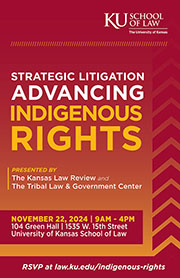
9 a.m. - 4 p.m.
104 Green Hall
Indigenous communities in the United States face a variety of systemic obstacles that derive from a history of colonization, forced displacement and assimilation efforts that have marginalized them for generations. Currently, these communities deal with issues connected to their resources, environmental sustainability, economic well-being and the preservation of their cultural heritage. In response to these ongoing challenges, indigenous communities have resorted to legal action in order to protect their rights and sovereignty. Impact litigation allows these communities a chance to advance their rights through the courts by establishing important legal precedents.
The 2024 Kansas Law Review Symposium will explore ways that indigenous communities have recently used strategic and impact litigation as a way to advance their rights. On November 22, 2024, the Kansas Law Review and the Tribal Law & Government Center at KU Law will host a joint symposium and tribal law conference at Green Hall, featuring scholars from across the country to discuss contemporary developments in strategic litigation aimed to support indigenous rights.
The symposium will examine strategic and impact litigation aimed at advancing indigenous rights and addressing systemic issues affecting tribal communities. Through this symposium, we seek to engage scholars writing in diverse areas of law including class actions, tribal lawyering, environmental protection, property rights, criminal law, etc.
Visit the 2024 Kansas Law Review Symposium event page for a full schedule of the speakers' presentations.
No CLE credit was offered during the symposium.
Scholarship associated with the Symposium will be published in a spring 2025 edition of the Kansas Law Review.
Speakers and topics included:
"Developments, Innovations and Opportunities for Indian Country on the Southern Plains "
- Alex Red Corn | University of Kansas | Associate Vice Chancellor, Office of Sovereign Partnerships and Indigenous Initiatives; Director and Associate Professor, Indigenous Studies Program
- Raymond Red Corn III | 𐓨𐓘𐓺𐓟𐓮𐓤𐓘𐓪𐓰𐓘𐓲𐓣 (Place to Borrow Money), A Community Development Financial Institution of the Osage Nation | Former Assistant Principal Chief of the Osage Nation
- Joseph "Zeke" Rupnick | Prairie Band Potawatomi Nation | Chair Person
"Improving Upon the Status Quo: Tribal Co-Management and Shared Services"
- Elizabeth Kronk Warner | S.J. Quinney College of Law at the University of Utah | Dean and Professor of Law
"Strategic Litigation in Pursuit of Indigenous Justice"
- Laura Hines | University of Kansas School of Law | Centennial Teaching Professor; Director, Shook, Hardy & Bacon Center for Excellence in Advocacy
- Stacy Leeds | Sandra Day O’Connor College of Law, Arizona State University | Dean and Professor of Law
"Cy Pres in Action: How the Native American Agriculture Fund Works Toward Addressing and Reducing the Harms of Claimants"
- Whitney Sawney | Native American Agriculture Fund | Director of Communications and Policy
"Tribal Sexual Assault Jurisprudence"
- Sarah Deer | University of Kansas | Distinguished Professor
"Rosalind’s Refund: A Young Woman’s Challenge to $16.29 in Taxes Leads to McClanahan v. Arizona"
- Bethany Berger | Iowa Law School | Professor of Law
"The Evolution of Tribal Lawyering"
- Robert Odawi Porter | Cornell Law School | Visiting Professor
"Recent Developments in Tribal Law"
- Layatalati Hill | Oneida Judiciary | Chief Trial Court Judge
- Zach Pahmahmie | Prairie Band Potawatomi Nation | Vice Chair Person
- Darren Root | Prairie Band Potawatomi Nation | Tribal Attorney
2023 Kansas Law Review Symposium
Home is Where the Law Says: 75 Years of Shelley v. Kraemer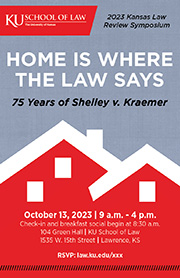
Friday, October 13, 2023
9 a.m. - 4 p.m.
104 Green Hall
At a most basic level, a person’s home should be a source of safety, comfort, and privacy. Home ownership is central to family life and plays a critical role in generational wealth and financial security. Where a person lives is correlated to crime rates, mortality rates, and school success. The freedom to decide where you live has historically been restricted to a small, wealthy, white section of the population. As we’ve struggled as a nation to ensure greater access for all Americans, the law has played the role of both sword and shield, at times cutting off access to housing for marginalized communities, at other times protecting it.
In 1948, the United States Supreme Court decided the landmark case Shelley v. Kraemer, a case brought to enforce a racially restrictive housing covenant in St. Louis, Missouri. This type of housing covenant, which kept Black and Asian Americans from living in that neighborhood, was not uncommon, and, in this case, was used to expel the Shelley family from their new home. The Court held for the first time that it was unconstitutional under the 14 Amendment for the judiciary to enforce such racially restrictive covenants. This holding was the most protective national measure yet against racial housing discrimination in the United States, but it stops far short of preventing discrimination itself. After 75 years, this case and the issues that created it are still in play in the United States.
On October 13, 2023, Kansas Law Review hosted a symposium on this very issue on KU’s Campus, featuring scholars from across the country to revisit Shelley v. Kraemer after 75 years.
This symposium explored modern legal theory and realities of property rights, housing access, race and segregation, contracts, and the implicit and explicit powers and effects of the law. Through this symposium, we seek to engage scholars writing in diverse areas including property rights, housing rights, constitutional law, contracts, tenancy, access and discrimination, zoning, tax, etc.
Visit the 2023 Kansas Law Review Symposium event page for a full schedule and abstracts of the speakers' presentations.
No CLE credit was offered during the symposium.
Scholarship associated with the Symposium will be published in a spring 2024 edition of the Kansas Law Review.
Speakers and topics included:
- Keynote speaker: Taja-Nia Henderson | Professor of Law,
Dean of Rutgers Graduate School-Newark | "Before Shelley: Black Community Making in the Face of Local Hostility" - Stephen Clowney | University of Arkansas School of Law | Professor of Law | "Nationalize Zoning Law"
- Randall Johnson | UMKC School of Law | Professor of Law | "How To Limit The Downstream Costs Of Racially Restrictive Covenants"
- Rosa Newman-Ruffin | Elon University School of Law | Assistant Professor of Law | "Community Choice: Does the law do enough to protect access to housing when our economic system does not?"
- Brandon Weiss | American University Washington College of Law | Professor of Law | "Affirmatively Moving Beyond Shelley in Light of Major Questions"
- Lua Yuille | Northeastern University School of Law | Professor of Law and Business; Associate Dean for Research and Interdisciplinary Education | "Shelley Can’t Save Us … Because It Wasn’t Meant To"
2022 Kansas Law Review Symposium
“Parents” and the Modern Family: What Do the Evolving Laws of Parenting Mean for Children and the Rest of Us?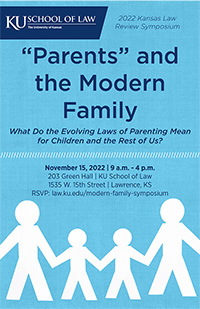
Tuesday, November 15, 2022
9:30 a.m. - 3:30 p.m.
203 Green Hall
Families living in the United States are more economically, racially, and socially diverse than ever before. And yet, the law has inconsistently—and sometimes inadequately—protected the interests of individuals who parent outside of the functionalist nuclear family model. But how do laws that protect, establish, disestablish, regulate, or otherwise imagine "parenting" impact the rights of children and childhood outcomes?
The Kansas Law Review Symposium will host a panel of scholars from across the country to respond to this essential question, as well as to propose legal reforms to improve outcomes for the children of America's modern families.
Visit the 2022 Kansas Law Review Symposium event page for a full schedule and abstracts of the speakers' presentations.
No CLE credit was offered during the symposium.
The symposium was sponsored by the Shook, Hardy & Bacon Center for Excellence in Advocacy.
Scholarship associated with the symposium will be published in a spring 2023 edition of the Kansas Law Review.
Speakers and topics included:
- Keynote speaker: Catherine Smith | Strum College of Law, University of Denver | “Exploring Children’s Equality Law in the Age of Parents’ Rights”
- Charisa Kiyô Smith | CUNY School of Law | Associate Professor | “Of Empathy Gaps & Family Survival: How COVID Capitalism Silences Children”
- Sacha Coupet | Loyola University Chicago School of Law | Professor of Law | “Parents as Partners in Protecting Democracy”
- Neoshia Roemer | University of Idaho College of Law | Assistant Professor of Law | “Parenting and the Ninth Amendment”
- Melanie Daily | University of Kansas School of Law | Clinical Associate Professor | “Finding a Place for Children in the Law of Disestablishing Relationships”
- Gillian Chadwick | Washburn University School of Law | Associate Professor | “The Noncitizen Parent Trap”
2021 Kansas Law Review Symposium
Judicial Conduct & Misconduct: A Review of Judicial Behavior from Sexting to Discrimination
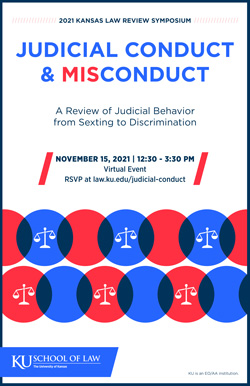 November 15, 2021
November 15, 2021
12:30 - 3:30 p.m.
Virtual event
Tasked with resolving all matters before them, judges are perceived to be impartial, fair and just. They are expected to behave ethically according to the Model Code of Judicial Conduct. Their authority, however, has prevented judges from always seeing the consequences of their actions. Judges have allegedly engaged in many unethical behaviors such as sexting through smartphone applications and emails, posting about political biases and confidential cases on social media, and engaging in discrimination against staff and litigants.
The Kansas Law Review Symposium will host a panel of judicial ethics experts from across the country to discuss judicial conduct and misconduct, guidelines necessary to promote ethical behavior, and reforms needed to prevent any similar conduct in the future.
A recording of the symposium is available on KU Law's YouTube channel.
Visit the 2021 Kansas Law Review Symposium event page for a full schedule and abstracts of the speakers' presentations.
No CLE credit was offered during the symposium.
Scholarship associated with the symposium will be published in a spring 2022 edition of the Kansas Law Review.
Speakers and topics included:
- Keynote speaker: Hon. Caleb Stegall | Kansas Supreme Court | "The Ethics of Decision Making: Result Oriented Judging and the Oven of Akhnai"
- Ross Davies | Antonin Scalia Law School, George Mason University | "Impeachment By Any Other Name"
- Michael Ariens | St. Mary’s University School of Law | "The Appearance of Appearances"
- Stephen Sheppard | St. Mary’s University School of Law | "Justice and the Rules: The Moral Obligations of Magistracy Versus Canons, Codes, and Rules of Judicial Conduct"
- Susan Saab Fortney | Texas A&M University School of Law | "Taking Courthouse Discrimination Seriously: The Role of Ethical Leadership by Judges"
- Christopher Joseph | Joseph, Hollander & Craft, LLC | "Representing Judges in Judicial Conduct Cases"
2020 Kansas Law Review Symposium
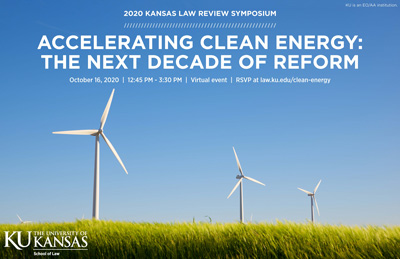 Accelerating Clean Energy: The Next Decade of Reform
Accelerating Clean Energy: The Next Decade of Reform
October 16, 2020
1-3:30 p.m.
Virtual event
Speakers from across the nation presented and discussed the topic of "Accelerating Clean Energy: The Next Decade of Reform” at the 2020 Kansas Law Review Symposium.
We are now at a point in the renewable energy transition that wind and solar power have become essential generation resources on the electric grid. For the first time, in 2019, wind overtook coal production in two states – Kansas and Iowa. At the same time, the next phase of development will only be more challenging. Fossil energy companies are fighting to preserve market share through litigation and advocacy at the state and federal levels; new facilities are facing opposition as they are proposed closer to population centers; and grid governance continues to evolve and adapt to accommodate increased intermittent power sources.
Current legal frameworks have carried renewables this far, but are they sufficient to accelerate clean energy in the next decade? We know from the Intergovernmental Panel on Climate Change that the next ten years – 2020 to 2030 – is critical for climate change mitigation. The overarching question the symposium will explore is – what reforms are needed in law and policy to accelerate clean energy over the next critical decade?
No CLE credit was offered during the symposium.
Speakers and topics included:
- Joel Eisen | University of Richmond School of Law | "COVID-19’s Impact on Renewable Energy Development"
- Elizabeth Kronk Warner | University of Utah S.J. Quinney College of Law | "Renewable Energy Development in Indian Country"
- Uma Outka | University of Kansas School of Law | "Renewable Energy Siting for the Critical Decade"
- Melissa Powers | Lewis & Clark Law School | "Beyond Natural Gas: Lessons from the Beyond Coal Movement to Prevent Natural Gas Lock-In"
- Joseph Tomain | University of Cincinnati College of Law | "Still Greening After All These Years"
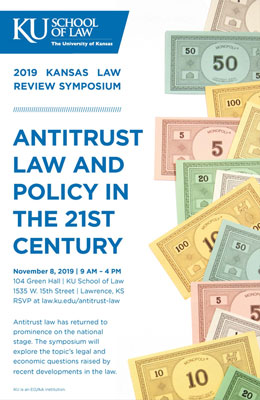 2019 Kansas Law Review Symposium
2019 Kansas Law Review Symposium
Antitrust Law and Policy in the 21st Century
November 8, 2019
8:45 a.m. - 4:30 p.m.
University of Kansas School of Law
Green Hall
Antitrust law has returned to prominence on the national stage. The 2019 Kansas Law Review Symposium will explore the legal and economic questions raised by recent developments in antitrust law.
Speakers included:
- Roger P. Alford| Notre Dame Law School
- Elyse Dorsey | Federal Trade Commission
- Jéssica Dutra | Economists Incorporated
- Thom Lambert | University of Missouri School of Law
- Derek Schmidt | Attorney General, State of Kansas
- Kristian Stout | International Center for Law & Economics
- Sean Sullivan | The University of Iowa College of Law
- John Yun | Antonin Scalia Law School, George Mason University
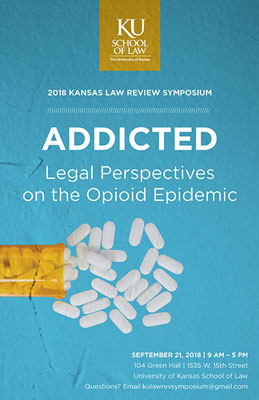
2018 Kansas Law Review Symposium
Addicted: Legal Perspectives on the Opioid Epidemic
September 21, 2018
9 a.m. - 4 p.m.
104 Green Hall
Killing over 115 Americans every day, the opioid epidemic has become one of our nation’s foremost health crises. The 2018 Kansas Law Review Symposium brought together scholars of varying backgrounds to explore legal issues and perspectives related to this epidemic.
Speakers included:
- Elizabeth Weeks, Associate Dean for Faculty Development and J. Alton Hosch Professor of Law, University of Georgia
- James G. Hodge, Jr.,Professor of Law, Arizona State University
- Kelly K. Dineen,Assistant Professor & Director, Health Law Program, Creighton University
- Laura Hines, Professor of Law, University of Kansas School of Law
- Micah Berman, Associate Professor of Public Health and Law, Ohio State University
- Stacy L. Leeds, Professor of Law and Vice Chancellor for Economic Development, University of Arkansas
- Stacey A. Tovino, Judge Jack and Lulu Lehman Professor of Law, University of Nevada Las Vegas
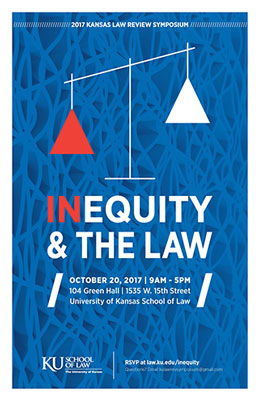 2017 Kansas Law Review Symposium
2017 Kansas Law Review Symposium
Inequity and the Law
October 20, 2017
9 a.m. - 4:15 p.m.
University of Kansas School of Law
Green Hall
While the law is equated with justice, it is not free from the inequities that exist in society. The Kansas Law Review 2017 Symposium brought together legal scholars and thinkers from a variety of perspectives who addressed how inequity affects their fields of expertise, including education, immigration and business.
Speakers included:
- Alia Al-Khatib, Law Fellow at the Southern Poverty Law Center
- Bertrall Ross,Professor of Law, Berkeley Law
- Jamila Jefferson, Associate Professor of Law, University of Missouri-Kansas City School of Law
- Jayesh Rathod,Professor of Law, American University Washington College of Law
- Lua K. Yuille, Associate Professor of Law, University of Kansas
- Matthew Shaw, Assistant Professor of Law, Assistant Professor of Education, Vanderbilt University
- Richard Hynes, John Allan Love Professor of Law, University of Virginia
- Yolanda Vazquez, Associate Professor of Law, University of Cincinnati College of Law
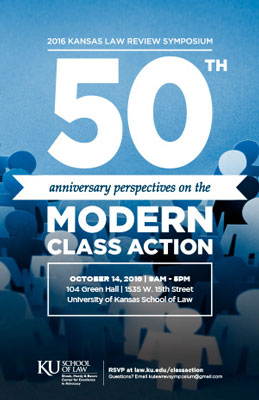 2016 Kansas Law Review Symposium
2016 Kansas Law Review Symposium
50th Anniversary Perspectives on the Modern Class Action
October 14, 2016
9 a.m. - 5:30 p.m.
104 Green Hall
On the occasion of the 50th anniversary of the 1966 Amendments to Rule 23, the symposium explored the emerging challenges and contemporary contours of the class action. A prestigious collection of scholars, judges and practitioners addressed topics including the ascertainability of class members, post-Comcast heightened scrutiny of class damage models, dual certification of money damages and injunctive class actions, and the expansion of class actions globally.
Speakers included:
- Adam Zimmerman, Professor of Law, Gerald Rosen Fellow, Loyola Law School
- Deborah Hensler, Judge John W. Ford Professor of Dispute Resolution and Director of Law and Policy Lab, Stanford Law School
- Laura Hines, Professor of Law, University of Kansas School of Law
- Myriam Gilles, Professor of Law, Cardozo School of Law
- Robert Bone, G. Rollie White Teaching Excellence Chair in Law, University of Texas School of Law
- Suzette Malveaux, Professor of Law, The Catholic University of America Columbus School of Law
Judges Panel:
- Judge Robert Dow, U.S. District Court, Northern District of Illinois
- Judge John Lungstrum, U.S. District Court, District of Kansas
- Judge Laura Denvir Stith, Supreme Court of Missouri
Practitioner Panel:
- Eric Barton, Wagstaff & Cartmell
- Molly Carella, Shook, Hardy & Bacon
- Robert Coykendall, Morris Laing
- Rex Sharp, Rex A. Sharp PA
- Holly Pauling Smith, Shook, Hardy & Bacon
- Victoria Smith, Stinson Leonard Street
- Brad Wilders, Stueve Siegel Hanson
Contact the Kansas Law Review
Faculty Advisors
Laura Hines
lhines@ku.edu
785-864-9265
Alex Platt
alex.platt@ku.edu
785-864-0509